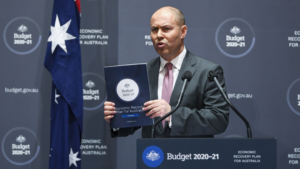Home » Commentary » Opinion » Too much spending, not enough reform
Robert Carling, Tony Makin, Peter Tulip, Simon Cowan
· Ideas@theCentre

 The Budget is very focused on the short-term, too heavy on spending and too light on permanent structural reform.
The Budget is very focused on the short-term, too heavy on spending and too light on permanent structural reform.
“New spending is enormous, and although most of it is supposed to be temporary one wonders whether it will be fully unwound. Over four years spending increases outweigh tax decreases by more than $4 to $1,” CIS Senior Fellow Robert Carling says.
“It is unsatisfactory that stage 3 of the income tax cut has not been brought forward at all, let alone to 1 July 2020 like stage 2. It is stage 3 that contains the real reform in this tax cut, but it may never happen — even though it is currently in legislation.
“There is also no permanent investment allowance. The full expensing of new investment only applies up to 2022 and is subject to a size-of-company cap. The investment allowance is inferior to a company tax cut, but the government should at least adopt a permanent investment allowance if the company tax cut is politically unachievable.
“It was similarly disappointing that there was no word on the rate of JobSeeker allowance after the end of this year.”
CIS author and Griffith University Professor of Economics Tony Makin agrees there should be serious concern about the prospective doubling of Australia’s net public debt to around $1 trillion within a few years.
“We’re told it is not a problem because our public debt had been relatively low compared to other developed economies. But Australia mostly borrows from abroad, unlike other developed economies (except for Greece), with public debt interest paid to foreign bondholders already a multiple of the foreign aid budget, Prof Makin says.
“”It’s been assumed that interest rates payable on that debt in coming years will stay very low, but this is highly speculative and overly optimistic, as the sharp rise in debt heightens the risk of a future credit rating downgrade and/or the emergence of an interest risk premium.
“In addition, world interest rates are likely to be significantly higher when the public debt has to be refinanced in light of massive recent global borrowing and the inflationary pressures likely to arise from excess money creation around the world.
“International empirical evidence suggests the sharp escalation of federal and state public debt will act as a drag of up half a per cent on Australia’s economic growth going forward.”
Prof Makin also says that boosting infrastructure is not the answer to restoring jobs temporarily lost in the services industries (eg hospitality, tourism) due to the government-imposed restrictions.
“All projects included in the infrastructure spend (an additional $14 billion in new and accelerated infrastructure projects over the next four years — thankfully less than many were expecting) have to pass muster on cost benefit grounds for them to add to long run productivity.
“There will be inevitable administrative delays in starting infrastructure projects and a serious mismatch of skills between those who lost their jobs due to the lockdowns and those needed to build infrastructure. Baristas, waiters and beauticians are unlikely to want to wield picks and shovels in regional areas.”
CIS Chief Economist Dr Peter Tulip applauds that the Budget did not expand social housing.
“As a welfare measure, there are higher priorities, like helping the unemployed,” Dr Tulip says. “As a stimulus measure, social housing never made sense. The main constraint on construction is planning restrictions, and NIMBYs oppose social housing even more fiercely than they oppose private development. If planning approval can be accelerated, then the private sector is eager to provide new housing at zero cost to the taxpayer.”
CIS Research Director Simon Cowan says the focus on short term solutions also left Australia’s workers facing the potential pay cuts and job losses from the planned super guarantee rise.
“The government’s failure to abandoned the proposed super increase is another example of its failure to prosecute a longer term reform agenda in this budget,” he says.
Too much spending, not enough reform